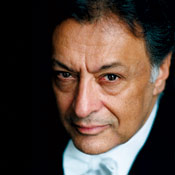
Zubin Mehta
L.A.’s favorite son, Zubin Mehta, returned to the podium at Disney Hall on Thursday night to conduct a varied program of works by Anton Webern, Béla Bartók, and Beethoven.
The concert opened with Webern’s Passacaglia, Op. 1, a work that combines a traditional musical form with a modern (at the time) style. Webern’s choice of the passacaglia – a mostly Baroque device that originated in Spain in the 17th century with notable examples in Bach’s Passacaglia and Fugue in C minor and the final movement of Brahms’ Symphony No. 4 in E minor – reflects his frequent use of such traditional forms. The Webern Passacaglia incorporates tonal aspects reminiscent of the romanticism of Brahms and Mahler with the atonal influence of Webern’s teacher at the time, Arnold Schoenberg, in a compact (10-minute), but lush musical experience for the listener.
Unlike his younger and more energetic counterpart, Gustavo Dudamel, who waits for complete silence from the audience before lifting his baton, Mehta didn’t waste any time starting. Considering how long it takes L.A. Phil audiences to quiet down at the beginning of the concert, not to mention during the breaks between movements, one wishes that Mehta would have waited a little longer because it was difficult to hear the opening pizzicato notes played by the strings. But once he started, the orchestra responded and performed the piece admirably.
The first half concluded with Bartók’s second piano concerto, a three-movement piece with two exuberant outer movements sandwiching a middle movement which itself is like a miniature concerto with a presto section between two adagio sections. The opening movement, sans strings, features a prominent role for the trumpet, played brilliantly by L.A. Phil’s principal, Donald Green. Interestingly, the second movement is the first time the strings play and they do so by opening the movement with a muted chorale in the “night music” style typical of many Bartók compositions. This is followed by the piano accompanied only by the timpani, played superbly by principal timpanist Joseph Periera. The final movement returns to the energetic style and tempo of the first movement.
In writing the second concerto, Bartók was trying to compose a piece that was more accessible to audiences than his first piano concerto, which he succeeded in doing. But the second concerto is still a bear for the orchestra and the soloist, making demands on both. One couldn’t discern that last night, however, because both the L.A. Phil and soloist Yefim Bronfman cut through the concerto like a knife through butter. And, of course, Mehta knows the piece well because he conducted its premiere in Los Angeles with the L.A. Phil 47 years ago this month.
Bronfman rewarded the audience’s appreciation of his thrilling performance of the Bartók with an encore of a decidedly more serene nature, Schumann’s Arabesque in C major, Op. 18.
But it was the “Eroica” that was the centerpiece of the evening. In the past few years, Mehta has conducted the L.A. Phil in performances of late Bruckner symphonies, and last night he conducted Beethoven’s Symphony No. 3 in E flat like a Bruckner symphony, stately and majestically. Perhaps this reflects the fact that Mehta has conducted the “Eroica” dozens of times in a career that has spanned several decades and he may be now looking for an interpretation that more closely matches his own station in music.
Even though the performance wasn’t thrilling the way a Dudamel performance might have been, it was nevertheless magnificent. From the two opening E flat chords, which were played not quite as staccato as written, to the last E flat chord of the symphony, Mehta never hurried the music as one might be tempted to do by the rhythmic momentum Beethoven builds into each movement. Mehta played the “Eroica” not like the revolutionary piece composed by a 33-year-old that arguably ushered in the modern symphony, but like the culminating piece of a life’s work by a much older composer.
Although Mehta always brings out the best in the L.A. Phil and must keep a special place in his heart for his adoptive orchestra and city, it doesn’t show in his outward expressions. He never smiles and, at least from facial expressions and body movements, doesn’t seem as if he is enjoying himself. In fact, he walks on and off stage so slowly, occasionally glancing up at the audience in the Orchestra East section without any apparent acknowledgement, that one wonders if he is feeble or depressed; that is, until one watches him on the podium, where he comes to life and is energized by the music.
Regardless, it is always a treat to hear the L.A Phil under Mehta.





